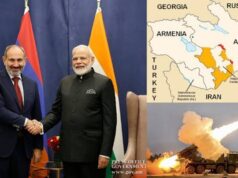Prime Minister must not visit Ukraine

Western Media is talking about Prime Minister Narendra Modi’s visit to Ukraine in August, marking the first-ever visit by an Indian Prime Minister to the country since it emerged from the disbanded Soviet Union in 1991.
This talk has started as USA and Western Europe were totally miffed by Modi’s visit to Russia, after taking over reigns of the third NDA Government in New Delhi. This trip if it happens will surely be of historical significance, just six weeks after PM’s high-profile meeting with Russian President Vladimir Putin in Moscow.
Narendra Modi’s visit to Kiev is being projected by vested interests as an attempt to balance India’s longstanding relationship with Russia and its growing ties with the West particularly the United States.
The Moscow visit just weeks after Swearing in as PM for a third tenure indicated a robust strategic relationship between New Delhi and Moscow. It was also an indicator to Washington and other Western capitals that India does its own strategic thinking. The Ukraine’s President Zelensky even had the temerity to call the meeting a “huge disappointment” and a “devastating blow to peace.”
Modi’s engagement with Putin came shortly after he assumed office for the third time, highlighting the enduring ties between India and Russia. These ties are deeply rooted in historical, military, and economic contexts. No wonder USA, Western Europe and USA allies are now trying their level best to put pressure on India to severe its relationship with time tested Russia. The United States, whose wretched Nixon had tried to threaten India in 1971 with a nuclear armed naval flotilla, has been most vocal about its disapproval. Indians can never forget that threat.
The United States has now expressed its concerns over Modi’s visit to Moscow. US Assistant Secretary of State for South and Central Asia, Donald Lu, during a US Congressional hearing, criticized the symbolism and timing of Modi’s meeting with Putin, which he had no business to do so. The US Ambassador to India, Eric Garcetti, also hinted at the problematic nature of India’s claim to “strategic autonomy,” suggesting that true strategic autonomy may not be achievable in today’s interconnected world. For this the Ambassador should have been called in by the Videsh Mantrayala.
India, a non nuclear power in 1971 was not awed by Nixon. Today India is a nuclear power and its nuclear armed missiles can reach any part of the world, will certainly not be concerned about “ threats “ from any power. Therefore India has firmly maintained its stance on its Strategic and even tactical freedom in its diplomatic engagements. New Delhi’s swift response to American objections emphasized that every nation has the right to pursue its own interests in a multipolar world. This assertion of sovereignty is central to India’s foreign policy, which seeks to avoid being drawn into the polarizing dynamics of global geopolitics.
In fact increasingly it will be India, which will be the driver of Geopolitics. Now India has become the fourth pole, USA, Russia and China being the other three.
A significant factor in the US unease over Modi’s visit to Moscow is the deep military ties between India and Russia. India and Russia have both extensive and intensive military equipment and technology relationship, even as it is increasingly acquiring advanced indigenous defence systems.
Though India has been reducing its defence imports and even slowly becoming a defence exporter, for gap filling in certain critical areas, India has diversified its defence imports from the United States and few other countries too.
Even as USA wants to earn money it forgets that India is not taking its arms / equipment as a military aid but paying in hard currency. So the concern raised by USA regarding this dual engagement presenting potential security risks for the US is pure “ bunkum “. In case they fear that sensitive American technology might be compromised through India’s continued interactions with Russia then USA should simply stop selling them. France, Israel and others have no concerns like this. As it is soon India will be fully “Atmanirbhar “ in all of these areas.
India’s ongoing purchase of Russian crude oil, despite unilateral Western sanctions on Russia, has further strained relations with the US and the European Union. The US argues that such economic ties undermine the collective effort to isolate Russia following its actions in Ukraine. However, India’s approach is guided firstly by pragmatic considerations of energy security and economic stability, rather than political allegiances. Secondly Russia is a strategic friend and will not be ditched under any circumstances. Thirdly India abides by only those sanctions which are imposed under a UN mandate.
India’s pursuit of strategic autonomy is not just a stance of Non Aligned days. Now it is based on its economic, military and diplomatic power. This is a pragmatic approach to its foreign policy. By engaging with multiple countries globally, India aims to safeguard its national interests on its own power without becoming dependent on any single entity. This approach is reflected in its participation in various international forums, including the BRICS bloc (Brazil, Russia, India, China, and South Africa), which is now offering alternative visions to the Western-dominated global order. The BRICS GDP is now much more than that of G7 nations.
Moscow has been a reliable partner for India in various sectors, including education, energy, science, technology, and healthcare. The BRICS+ bloc has further cemented this partnership, causing anxiety and fear in the US, which views the growing influence of China and Russia with concern. The fear is that these alliances have started breaking down the US hegemony and offer a new world order that diminishes American influence.
The US criticism of India’s engagement with Russia is viewed by Indians as hypocritical, given its own alliances with authoritarian regimes and military dictatorships in regions like the Middle East. The US often overlooks the questionable human rights records of its allies and lackeys like Pakistan while condemning others for similar transgressions. This selective morality has led to accusations of double standards and undermines the credibility of the US when it lectures other nations on ethical foreign policy. While the US portrays itself as a beacon of democracy, its foreign policy often supports regimes that contradict these ideals.
So whether Modi visits Ukraine or sends his Foreign Minister will be closely watched by Moscow, Washington, and other global players. India has no need to do any balancing of its relations with Russia and the West at whims and fancy of others. It must assert itself by playing its role as an independent and sovereign nation capable of making its own strategic choices. Therefore India’s ability to navigate the complex web of global geopolitics while maintaining its stance on strategic autonomy will best be done by not having any visit to Ukraine.
However if Zelensky publicly asks for New Delhi’s help for devising a peace formula then Indian Foreign Minister can go there.




